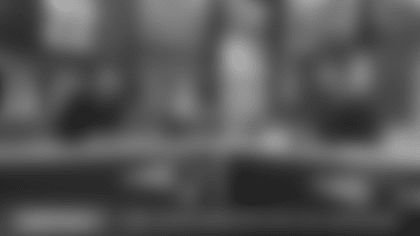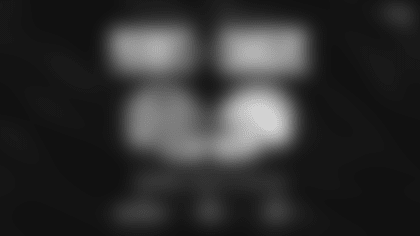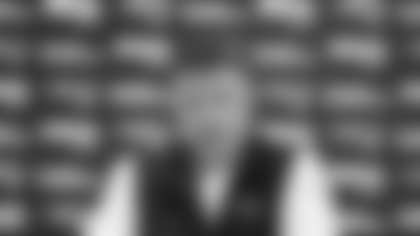BB: Well, this is, you know, getting ready for Atlanta now. This is a team we're really not very familiar with, so we've had to do a lot of digging, get caught up here. Fortunately we have a little bit of extra time to do that and I think we'll need it; I know we'll need it. They've done a great job. Coach [Dan] Quinn, Thomas [Dimitroff] have put together a very good football team. They're very explosive, have tremendous playmakers on offense, very fast, and playmakers on defense, turn the ball over, create a lot of negative plays. They're just a solid team that's had a great year. They've kind of been on top there wire to wire. They're an impressive team to watch. We've got a lot of work to do. We've got a lot of things that we need to understand and how to play Atlanta, how to play them well. Things that we're going to need to do well in this game are different from any game that we've played here in a little while. We've just played opponents that have a little bit different style of play. These guys have a very good style. It's been a very successful style. We have a lot to get ready for, a lot of work to do, but it's good to be working this time of year. We're excited, ready to go and we'll dig into it here, get on the field today and start making some progress.
Q: You have four practices scheduled before you fly to Houston. How much of the game plan will have been prepared after that time? Is it about 50 percent or would you be ready to play this coming Sunday if that was the case?
BB: Yeah, it's somewhere between 50 and 100, somewhere in there. We'll be certainly more than halfway there, but there will be some things that will be, particularly some situations, that we'll be covering in Houston. How exactly that will break up, we'll just have to kind of see how it goes. I don't think we need to go to something until we have what we're doing right just to be moving. We'll just kind of see how these days go as to how far we get, but we won't get all the way. We won't try to do that, but hopefully we'll have a good chunk of it in and feel confident about what we're doing so that we can kind of keep that part of it tuned up, and then go into some new areas down there and make sure that we have those tied up, too.
Q: Has that schedule of preparation evolved over the years as you get more familiar with the process leading up to the Super Bowl?
BB: Yeah, we've done it a couple of different ways. We've traveled on different days. Now it's a little different schedule down there than what it was. We've had one week Super Bowls. I think each one is a little bit different and each team is a little bit different, so what's right for this team may or may not have been right for some other team. There's not like a set grid that we just match up to. We try to do what's best for the particular situation - the team we're playing, what areas we need to emphasize maybe more in this game than possibly another game like this where just the emphasis points are different.
Q: What is it about Atlanta's style that caught your attention?
BB: Well, they're very explosive offensively. Every guy that gets the ball can score a touchdown from 80 yards away or more. Defensively they have very good team speed. They've got usually at least nine if not 10 of the players on the field, sometimes all 11, I'd say are pretty fast. They've got a couple of big linemen that they use; they're good. But then there are times where they only have one or two of them in there and the other guys are - their ends are fast, the linebackers are fast, the secondary is fast. Sometimes they take out the big guys and put in a couple of more fast guys like Grady [Jarrett] or guys like that. I'm not saying they're like track guys, but for their positon they're fast. They're athletic. They're very hard to block in space and pass protection and things like that.
Q: Given head coach Dan Quinn's background with Seattle, how relevant was your preparation for Seattle this year and a few years ago in Super Bowl XLIX when preparing for this Falcon's defense?
BB: There's some, but I'd say these guys - they're different. I mean it's the same but they're different. Certainly the players are different; that's one big thing. I'd say schematically it's not quite the same and certainly we wouldn't want to take it for granted that it is the same. I think they've modified a few things or handled some things maybe a little bit differently than what we practiced against for Seattle earlier in the year. There's certainly carryover, Ben [Volin]; I'm not saying that. It's not like its two different systems; it's not. I'd say how [Richard] Sherman plays it to the way [Robert] Alford plays it is not quite the same, even though it's the same defense or some of the calls are the same, I should say.
Q: How much time in practice do you guys spend on improving your communication?
BB: Every play. Yeah, every play. We work with the noise home and away depending on which side of the ball we feel that noise will be coming from. Particularity against Atlanta offensively, they have a lot of different formations and variations and personnel groups and there's quite a bit of motion, so they force the defense to react and adjust to what they do more than most teams that we play. That's challenging right there, even if there was no noise whatsoever. Then when you add crowd noise, and long drives, and guys getting a little bit tired or not as alert on the 10th play of the drive as on the first play of the drive, then that just stresses the communication a little bit more. So you start piling all of those things together, a long drive, crowd noise, degree of difficulty with formations and personnel groups and motion and those kind of things, some of which we haven't seen before. They're going to have some looks that we're not going to be able to practice. Coach [Kyle] Shanahan is probably drawing them up right now. I don't know if he knows what they are yet, but it'll be things that are designed obviously to give us a problem, so the communication against this team - we've got to stress it on a lot of levels.
Q: Do you find it to be easier to communicate with the coordinators when they are down on the field as opposed to how some teams have them up in a booth?
BB: Either way we have communication with the booth that is important, and we have communication on the field that's important. I've done it both ways personally. There are advantages to one, there are advantages to the other. There are problems you have to solve if you're one place or the other. It's just a question of which ones you want to solve. Both can work, there's a lot of different ways to do it. It's just trying to find which one is best for the way that your team and your staff is set up and that could certainly change. It's changed for me within the same organization, but you move a couple of people around and maybe you feel it's advantageous to do it a little bit differently.
Q: What is the advantage to having Josh McDaniels on the sideline as opposed to up in a booth?
BB: Well, again, it's everything. It's the combination of our entire staff and our coordinators and the players that we're working with, how we feel like it's most efficient. Any of those could work, especially now where you can have a coach-to-quarterback communication from the press box. I'd say without that it would just be another step from the coordinator making the call from the press box to the sideline, and the sideline making it into the signal caller. Now that step has been eliminated, but even with that step I think it still was very doable. I mean I did it so it was definitely doable. That was back in the prehistoric days; yeah.
Q: What do you like about Mohamed Sanu as a player?
BB: He's big, he's tough, he's got great hands; tremendous hands. He has a great catch radius. He catches everything. He's a tough blocker. He's hard to tackle. He's an explosive player.
Q: Is it easy to see why Atlanta's general manager Thomas Dimitroff would have interest in a player like that?
BB: [Mohamed] Sanu would help any team. There's not a team in the league that he wouldn't help.
Q: Mohamed Sanu has thrown passes before as a receiver. Is that something that you have to be prepared for?
BB: Yeah, sure. We know he can do it. Look, this is the kind of game where a team could be working on a play like that all year and you're running out of games. I mean it could be a lot of other plays, too; a reverse, a pass, a double pass, some kind of gadget play, so absolutely. The longer the season goes I think the more you have to be prepared for those kinds of plays because, again, if the team has been working on it then at some point they're probably going to use it and the fewer games there are to call it. If you've been working on a play all year, a lot of coordinators, you might as well call it.
Q: How difficult is it to identify a tip that could help you be ready for those types of gadget plays?
BB: Right. Look, you could draw up any gadget play you want. In the end it comes down to the basic fundamentals of your defense, so every defense is designed to defend the perimeter, to defend the deep balls, whether that's man to man, or zone, or four-man line, three-man line, whatever it is. It doesn't matter. You can't defend an offensive formation without defending the perimeter of the formation, without defending the vertical element that the formation could bring, defend the outside, defend deep, everything is in front of you - every defense has to have those elements to it. Who knows what you're going to be in? Who knows what play that they're going to run that you haven't seen before? You just have to count on the sound fundamentals of the defense to handle all of those things. Every time we put in a defense that's the first thing we do, is run strong, run weak, reverse, half back pass, passing game, four verticals, three verticals, double moves, deep crossing routes. Make sure that those plays are handled by the assignments in the defense. If you're going to be light on something you don't want to be light on those. You want to be light on something else. You don't want to be light on a seam route or on a post pattern or not have a run-force guy if they run a reverse. I mean it doesn't mean you have it done right every single time, but there's somebody that's responsible for it and it's their job to make sure that they handle that responsibility based on however the play is designed.
Q: What has made Matt Ryan elevate his game so much this year and how much did you pay attention to his career while at Boston College?
BB: Yeah, I mean certainly we had a good awareness of Matt [Ryan] here. That wasn't a player that we were going to take, so he really wasn't a factor for us at that point in time. Yeah, his development, I think you'd have to talk to him or somebody in Atlanta about that. We play him once every three or four years, so that's not really a guy that we see multiple times. He's had a great career. He, again, does everything well. He handles the line of scrimmage well, gets the team in the right plays, plays good in critical situations, deep balls, intermediate throws, possession passes, red area. He's athletic. He can get out of some trouble, so there are really no weaknesses to his game. He's a team player. He does the right thing for his team. He puts his team in a position to win. There's not much to not like about him.
Q: Did you know what Malcolm Butler was capable of after the 2014 Super Bowl and has his emergence just been a result of needing time to grow, or was there a major jump that you saw since that time?
BB: Well, I mean we put him on Antonio Brown in the opener in 2015. Obviously there has been growth over a period of time. I don't think you go from one level of a player to another in a few practices or a game or a half or whatever. I don't really think that's possible. But again, we thought that he had showed enough going into the 2015 season that he would be our guy that we would match up against certain receivers. I don't want to say number one receivers, but again, it depends on who we're talking about here. He's developed a lot since then like any player would from year one to year three, barring some either setback, or I'd say unusual circumstance. That's a big growth period for players.
Q: How impressed have you been with Malcolm Butler's personal growth aside from his football growth as his life changed a lot after the 2014 Super Bowl?
BB: Yeah, it did. It sure has - a long way from West Alabama. But you know, again, and that's absolutely true for Malcolm [Butler], and I would say we have a lot of other players in that category. I mean, guys come into this league and wherever they were, this is a huge jump on a number of levels - competitively, socially, economically, the attention from the fans and the media and so forth. It's huge. Not everybody is from Alabama and Michigan and USC [University of Southern California] and those places, so for some of those guys, and even the ones that come from there, it's still a huge jump for them. It's a big part of a big time in a professional player's career - making it the first year, but then that first to second or first to second to third. That's true for everybody.
Q: With two weeks to prepare, is your game planning any different? Is it more of a working document?
BB: I'd say it's the same as a normal week. It's just spaced out a little bit more. Instead of seven days, call it 10 - like we weren't on Monday where we would normally be on a Monday because we didn't know who we were going to play [until Sunday]. Normally, we know who the next opponent is so all the work is done on that team, so when we open the book on Monday morning, it's all there. [You're just] adding in the game they just played the day before, let's call it, right. In this case it wasn't, so we had to get all the information on Atlanta and that took a while to compile all of that, so once that's done, it's done. We have a couple days at the end of the week in Houston that are a little different than our normal two days before the game, so we kind of get squeezed on one end or the other. Let's call it 10 days in the middle instead of six or whatever, nine instead of six. It's just six but spread out. We have to travel and there are some other obligations that just kind of cut into a normal preparation time, but we have more time to do it. What was tough was the one-week game because then you have all of that crammed into a normal week of preparation. When that happened, I was involved in that in 1990 when we played Buffalo, I was with the Giants, but we had played them in December. Then of course in 2001 we had played the Rams in the middle of the season so it helped that short week in terms of - from a coaching preparation standpoint.
Q: What improvements have you seen from Shaq Mason this year in his second season?
BB: Yeah, a lot. Shaq [Mason] came to us from an offense that probably couldn't be more different than ours. Shaq is a good player - smart, works hard, a talented player - but from a technique and I'd say experience standpoint, the things that he did just couldn't be more different than what we do, so that was a process. We actually played him at left guard last year for the majority of the year, and then he played right guard for the last few games. I don't know, four or five games, whatever it was. Then this year he's played right guard, which is where he was at Georgia Tech. He played right guard at Georgia tech. That's a little bit different too, just footwork, hand placement, stance. It's not insurmountable, but it's just different, so I think when you combine all those things in his first year, he did a tremendous job for us last year, he did a great job, but I would say this year, second year on the right side, second year in our system, second year of seeing, again, defenses that were a lot different than what he saw based on the offense that they ran, that Coach [Paul] Johnson ran at Georgia Tech. All of that, plus a good offseason of training as opposed to, like all rookies, working out for the [NFL] Combine. Well, now you're working out for a team and a season where you know exactly what's required of you because you were there a year before. I think all of those things played into his development like they do for most guys in that first to second year.
Q: What does it mean to be able to go into this game with both of your sons working for you this year?
BB: Special. Yeah, special - unlike any other, really. It was obviously great to have Steve [Belichick] but to also have Brian [Belichick] too, I mean, it's special.
Q: In addition to identifying some of the plays Atlanta will likely run that your defense has never seen before, how important is it for the players to also understand the concept behind what they're doing?
BB: That's the most important thing is to recognize the concept. I mean look, they're not going to come in here and run 60 new plays. They're going to run the plays they've been running all year but dress them up differently, put a different look or a motion or combination and try to make it look a little bit different than anything we've seen or maybe something that they think will give us a problem to adjust to, and then do the things that they've been doing. I'm not saying there won't be a handful of new plays in there, but I mean, look, the way they move the ball and score points, they're not going to come in here and put in a new offense this week. They've had so much success with what they're doing, they're going to keep doing it but make it hard for the defense to recognize this is the play, and by the time you recognize it, the play is over. You know, they're spotting the ball and it's like, 'Aw, that's what that was.' You have a second-late reaction to that, so they do a great job of that. They do what they do, they do it well. They really know what they're doing, but defensively it takes you that extra split second to recognize it and sometimes you're just a step too late and they got you. Then the next play it's the same thing or another version of the same thing. I addition to that they have very good players, guys like [Devonta] Freeman, [Tevin] Coleman, [Mohamed] Sanu, [Julio] Jones, all of them. They've got the ball in their hands and what looks like a seven-yard gain could be 47. Their ability to make yards with the ball in their hands, break tackles, in Coleman's case, out-run people. I don't know how many times we've seen guys have a good angle on him and it looks like, 'Ok, they're going to intersect here,' and they don't. [Coleman] just out-runs him and now they're chasing him and now 15 now looks like 35, so they get a lot of yards on the ability of their skill players to gain yards after they get in the space.
Q: Is there any element of Mike Shanahan in Kyle Shanahan's schemes that have carried over?
BB: Absolutely. You can see a stretch play, number one.
Q: Bootleg and -
BB: They boot, yeah. Absolutely, they boot, but like I said, they run the stretch and they've got backs that can run it. They do a great job with that and if you can't defend that play however they do it, and they have a lot of different ways of doing it - they can do it out of 11, 12, tight ends together, no tight end, one tight end, motion a tight end, on and on, but if you can't stop that play it's going to be a long day.
Q: How much do the Falcons use Devonta Freeman and Tevin Coleman together, or do they?
BB: Yeah, it's usually one or the other.
Q: Are you holding on to gadget plays, like the flea-flicker last week, to use in the playoffs because they haven't been seen yet? How do you decipher when to use a play like that and when not to? For example, like when Mike Vrabel caught a touchdown pass in 2003.
BB: Right, well I mean in Mike [Vrabel's] case, he was part of our goal line offense that was a standard formation. It was a standard play. We ran the ball just as much as we threw it and I mean, the play we threw to him was just a crossing pattern. I wouldn't call it a gadget play at all. Other plays, I mean again, I don't want to get into a whole game planning thing here, but regardless of whether the play is a gadget play or not a gadget play, I don't even know a gadget play is. I mean, is the reverse a gadget play? Every team in the league runs them, so is that? I don't know. Where do you want to draw the line? We've all seen the flea-flicker that we ran. We've all seen that before, too. So it's not like nobody had ever seen that play run. Again, where do you draw the line? For us defensively, all of those plays fall into a certain category and there is a certain responsibility that has to be handled in order to stop the play. Offensively you run plays that you think will work, whether it's what you would consider a gadget play or whether it's what you consider the most basic play in football. If it's a good play, it's one you want to run. So when do we run them, how do we run them? I mean, the answer is really the same for every play in situations against looks that we think they'll be successful against. I know it's hard to imagine but we don't really want to call a bad play. That's not the idea. When that happens, then either we've put the players in a situation where they can't be successful because of the look or the defense or the play or whatever is was, just matches up poorly against what we had called, or we don't execute it properly and there's a breakdown somewhere and that's what happens. But we don't have intentionally any of those - that's not what we're trying to do. We're trying to have good plays.
Q: What are some of the things you've learned over the years that you need to get done here before you leave for the Super Bowl site?
BB: Well again, I think whatever point you get to, you get to. If that's - not to put a percentage on it - but 60 percent, 70 percent, I don't know. Whatever the number is, whatever you have, you have. Where you never want to be in game planning is you work on something but you don't really have it, so then what do you have? You've worked on it, you've covered it, but you don't really have it, then well you might as well go back to square one and start all over again. I think the best thing to do is wherever we are, that we're actually there, legitimately on our preparation. Not just we checked off a box, but we really don't have it. It will be important for us this week to get the things done that we're trying to get done. If we don't get all the way through what we thought we might get through, I mean that's not nearly as big of a problem as making sure that what we do cover, we actually have it right.







































